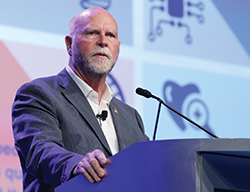
J. Craig Venter, PhD: ‘Human longevity is not just about trying to make people live longer.’
Supercomputers can analyze enormous amounts of data, and use algorithms to predict your life span and the development of diseases in their genesis. This heady update on technology and the status of precision medicine was delivered by J. Craig Venter, PhD, a leader in genome research, during Saturday’s Opening Ceremony.
“We are looking across the genome and across all diseases,” Dr. Venter says of his team’s research. “Human longevity is not just about trying to make people live longer; it is about trying to create a healthy life span.”
Dr. Venter led the effort to first sequence a genome in 1995, and then the human genome in 2001. Those early efforts were expensive and limited by the power of computers of that era. It cost $100 million to sequence the first genome; today, it costs $2,000 to sequence a human genome. In 1999, a 1.5-teraflop computer that Dr. Venter’s team used in its sequencing work cost $50 million; today, a 1-teraflop card for a PC costs $100. (A teraflop is a measure of a computer’s speed.)
The newest research vehicle for Dr. Venter is Human Longevity, Inc., a genomics-based, technology-driven company whose groundbreaking work is laying the foundation of precision medicine that could revolutionize the health and longevity of mankind.
Technology advances enabled by supercomputers are driving machine learning, which explores the construction of algorithms that can make predictions about different diseases based on huge amounts of data. This greater collection of data allows researchers to find variations in the genome, which is where medical problems arise.
“Our view is, if we can do early detection or predictions from the genome, where you can either alter these diseases or prevent them, it can have a huge impact on longevity. It is getting so we can predict your likely age of death or your longevity,” Dr. Venter says. “If we can change variants, they would be interesting druggable targets.”
Human Longevity is now using what it has learned to detect diseases at early stages in people who are not yet experiencing health problems. Dr. Venter highlighted some of those cases and the research data his company collected.
“The goal is to create this massive database … (to) improve the accuracy of predictions,” Dr. Venter says. “We will go from this early stage we are at now to having us be part of accurate ‘precision medicine.’”
